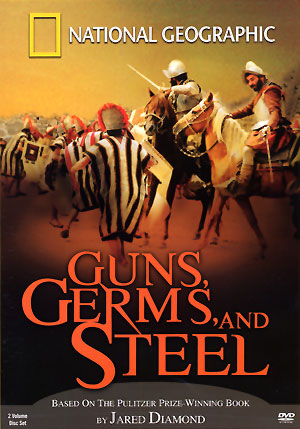
For a handout, download the PDF document outlining this assignment.
Description:
The purpose of this exercise is to start on the skills set needed for Research Summaries, a mainstay of UT's RHE 306 curriculum. The goal is to break down a complicated argument into claims, reasons, and evidence. This is a good exercise for early in the semester when simply introducing arguments and argument structure.
The subject of the lesson plan is the National Geographic video presentation of Guns, Germs, and Steel. It is a 3-episode series; I use Episode One: Out of Eden for this lesson. The episode is just under 60 minutes long.
The episode is hosted by the author, Jared Diamond, and it presents his argument for the claim that geography and its effects on human development over the last 13,000 years are the basis of the economic inequalities we see in the world today.
Diamond presents a very careful argument -- pretty much a textbook example of the process of posing a research question, making a claim to answer that question, and presenting clear evidence, examples, and support for the claim. One of the especially nice aspects of the film is that Diamond makes the process of building an argument very transparent.
For this lesson, I give the class a worksheet to fill out as they watch the film. I ask them to locate and write down the basics of the argument: research question, thesis, main claims, reasons given to support those claims, evidence to support those claims, examples, type of argument being made.
I follow-up the lesson with a homework assignment: They are to take their notes home and write a summary of the argument explaining how it worked and how it was organized.
For the next class period, we use the summaries and the film as a jumping-off point to talk about the Research Summaries they will be writing in preparation for the Unit I paper.
This plan will take an entire 1 hour and 15 minute class period – It would be really tight for a shorter class.
(Image Credit: Amazon.com)
Recent comments
2 years 29 weeks ago
2 years 44 weeks ago
2 years 44 weeks ago
2 years 50 weeks ago
3 years 4 weeks ago
3 years 4 weeks ago
3 years 4 weeks ago
3 years 6 weeks ago
3 years 6 weeks ago
3 years 6 weeks ago